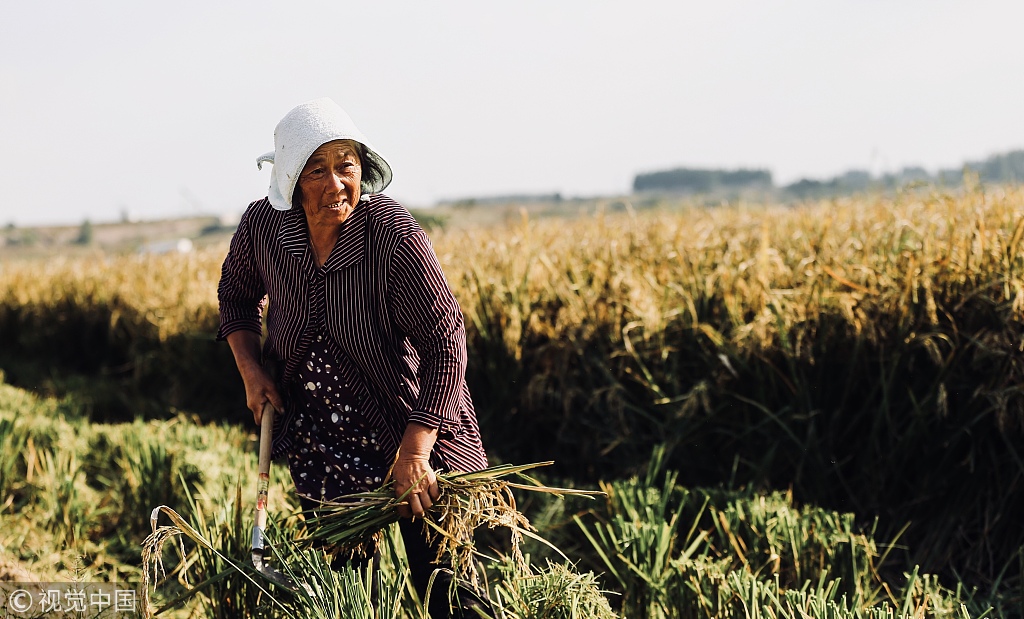
HEFEI -- China's agricultural conglomerate Beidahuang Group has just concluded the first season harvest on a modern rice plantation in Xiaogang Village, east China's Anhui Province.
More than 30 rice varieties were harvested in the pilot plantation of 33 hectares of field.
Entrusted by the Xiaogang village committee, the company made the project so that farmers can have a free and assured choice of what rice strains they would like to grow next season. The selection method meant the newly harvested rice was cooked so that farmers could taste of each one before making the decision.
Yan Lihua, 74, has leased his farmland to another villager, so that his family can focus on running the countryside bed & breakfast business, and those more able can get more farmland in the village to carry out larger scale farming.
Seniors like Yan have childhood memories of hunger, and the village was known for producing beggars because of the land's low yield, before it won the fame as the birthplace of China's rural reform.
Yan remembered the autumn harvest of 1979 was particularly joyous after decades of famine.
The unprecedented harvest came a year after farmers made a secret pact to resist the country's egalitarian agricultural system. This was the event that ignited China's nationwide rural land reform.
The pact meant that after the farmers handed a certain percentage of their produce to the government, they were able to keep the rest of the harvest from their contracted land themselves. Owning their own fields gave farmers enthusiasm to carry out intensive farming.
"That year, the village recorded a harvest of 66,500 kg of rice, six times of that reaped a year ago," said Yan Yushan, whose father Yan Hongchang was among the first 18 farmers to sign the secret agreement to divide communally owned farmland into family plots in 1978.
The family land contract responsibility system that derived from Xiaogang was spread nationwide by 1984, when China's per-capita grain amount reached 400 kg. It basically solved the country's food problem.
The name of Xiaogang has since been fixed in the nation's memory as the start of China's reform.
"We fought hard to get the land use right. Now we transfer it to earn rent. We are relieved from farming and can focus on things that we want to do," said Yan the senior.
The pioneering reform spirit has been taken on by village, which continues to motivate new reform initiatives.
Yin Yurong, a pig farmer in the village, recently brought up a new idea -- setting up a land stock cooperative.
"The former reform helped ensure us food. It is the responsibility of our generation to make new reforms to make people rich," she said.
Yin explained that her idea of land stock was not just to reward land leasing with rental fees, but also a certain amount of dividends from the land use if the land leaser joins the cooperative.
In August, her proposal was endorsed by the village committee. So far, over 40 households have signed to join the cooperative.
"We encourage the idea because it can help pool together redundant labor and release unused farmland kept by villagers," said Li Jinzhu, Party chief of the village committee.
Besides the individual endeavors, all 4,288 villagers in Xiaogang were turned into shareholders of the village's collective in 2017, to benefit from the business development from Xiaogang's intangible assets.
Villagers each received a dividend of 350 yuan (about $55.5) in February from the village collective's earnings of 8.2 million yuan from the operation in agriculture, education, tourism and capital management in 2017.
"Though it's not a big sum of money, it definitely marks a hopeful beginning," Yan Yushan said.
As a member of the village committee, Yan said the village's reform history was its intangible assets, attracting hundreds of thousands of visitors every year.
He said the village's collective had a think tank, with 18 entrepreneurs, all fellows from the village doing business in big Chinese cities.
With the intellectual supports, the village has set up a 400 million-yuan modern agricultural reform fund, invited the Beidahuang Group to begin modern farming and develop farm produce under the Xiaogang trademark.
